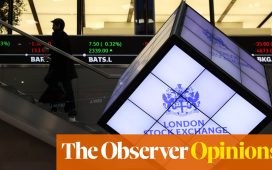Government may sell remaining NatWest stake to the public
In parliament, the chancellor has announced that he will explore the options for selling off the government’s remaining shares in NatWest to the public within a year.
Jeremy Hunt said he would “explore options” for a potential NatWest retail share offer in the next 12 months, but said it would be “subject to supportive market conditions and achieving value for money”.
Key events
Closing summary
The UK government will explore options for selling off its remaining 38.6% stake in the high street lender NatWest Group to the public within a year, bringing it back to full private ownership, Jeremy Hunt has announced.
Delivering his autumn statement in parliament, the chancellor said he would “explore options” for a retail share offer in the next 12 months but said it would be “subject to supportive market conditions and achieving value for money”. This means shares can be bought by anyone, whereas previous share sales were to financial institutions.
In a reference to the privatisations of the 1980s, when shares in British Gas were advertised to retail investors with the slogan “If you see Sid … Tell him”, the chancellor declared: “It’s time to get Sid investing again.”
Grangemouth oil refinery is to cease operations as soon as 2025, under plans announced by its owner, Petroineos, a joint venture between the Chinese state-owned oil firm and the petrochemicals empire owned by Monaco-based British billionaire Sir James Ratcliffe.
Amid warnings that the plan blew a hole in Scotland’s industrial base, trade unions and Holyrood politicians raised concerns about the job security of the 500 people directly employed at the facility, near Falkirk, and the impact the closure of one of Britain’s six remaining large oil refineries would have on the country’s fuel supply.
Petroineos, which has discussed its plans with the UK and Scottish governments, said it had had no choice but to adapt to global pressures affecting the refining market.
The culture secretary intends to ask the media watchdog to examine the Barclay family’s proposed deal to hand control of the Telegraph and the Spectator magazine to an Abu Dhabi-backed consortium.
Lucy Frazer said today she was “minded to” call in Ofcom to look at the investment fund’s plans to take over the titles in exchange for repaying £1.15bn of the family’s debts to Lloyds Banking Group.
In a statement to parliament on Wednesday, Frazer said her department had written to Lloyds, the Barclay family and the consortium, RedBird IMI, to inform them she was minded to issue a Public Interest Intervention Notice (PIIN).
Sam Altman is to return as chief executive of OpenAI after the ChatGPT developer said it had “reached an agreement in principle” for his reinstatement.
The San Francisco-based company made the announcement after days of internal turmoil after Altman’s surprise sacking on Friday. Nearly all of OpenAI’s 750-strong workforce had threatened to resign unless the board overseeing the business brought him back and then quit immediately afterwards.
The balance sheets of eurozone banks are showing “early signs of stress” after a rise in loan defaults and late payments by customers, the European Central Bank has warned.
Higher interest rates have boosted banks’ income and profits for the time being, the ECB said, but lenders are facing pressures from higher funding costs, worsening asset quality and lower lending volumes.
The central bank also warned in its twice-yearly financial stability review that higher interest rates and slower growth were posing problems for people, companies and governments in the euro area.
Tom Stevenson, investment director for personal investing at Fidelity International, said:
This was an autumn statement with references that may have only resonated with older voters. Jeremy Hunt promised to get ‘Sid’ investing again as the government prepares to sell its remaining stake in NatWest. It’s unlikely that anyone under the age of at least 50 will have recognised this reference to the 1986 sell-off of British Gas!
Will Howlett, financials analyst at the investment firm Quilter Cheviot, has looked at the government’s potential retail share offer for its remaining stake in NatWest Group.
The government is committed to exiting its 39% stake in NatWest by 2025/26 and will now explore options to launch a share sale to retail investors in the next 12 months. We see the government reducing their stake down to zero is more symbolic rather than having any implications for the bank’s strategy. As such, we believe it is the fundamentals of the business which are more important in driving share price performance rather than any technical overhang from a shareholder reducing their stake.
We do believe it reduces even further some of the remote risks with regard to introducing windfall taxes on banks ahead of the General Election as this would weigh further on already depressed valuations. In 2015, the government did propose something similar with regard to its stake in Lloyds but these plans were shelved. It will be interesting to see if this ends up going ahead or not.
US initial jobless claims fall more than expected
The number of Americans filing new claims for unemployment benefits fell more than expected last week, separate figures showed.
Initial jobless claims dropped 24,000 to a seasonally adjusted 209,000 for the week to 18 November, according to the US Labor Department. The decline more than reversed the jump in the prior week, which had lifted claims to a three-month high. Economists polled by Reuters had forecast 226,000 claims for the latest week.
The data was released a day early because of the Thanksgiving holiday tomorrow.
However, economists say the jobs market is still cooling.
Nancy Vanden Houten, lead US economist at Oxford Economics in New York, said:
Looking past seasonal noise, we think the claims data are consistent with a job market that is cooling enough to keep [interest] rate hikes off the table, but too strong to make rate cuts a consideration any time soon.
US durable goods orders plunge 5.4% due to transport
On the other side of the Atlantic, orders for US-manufactured durable goods plunged 5.4% in October, which was the biggest monthly drop since April 2020, and worse than expected.
The slump came after a 4.6% surge in orders in the previous month, according to US Commerce Department figures, and was caused by a sharp drop in orders for non-defence aircraft and parts, down 14.8% after an 11.6% jump in September.
Excluding the steep drop in orders for transportation equipment, durable goods orders were roughly unchanged in October after edging up by 0.2% in September.
Increases in orders for fabricated metal products and computers and electronic products were offset by declines in orders for primary metals and electrical equipment, appliances and components.
⚠️BREAKING:
*U.S. OCTOBER DURABLE GOODS ORDERS PLUNGE -5.4%; EST. -3.1%; PREV. +4.0%
*BIGGEST MONTHLY DROP SINCE APRIL 2020
🇺🇸🇺🇸 pic.twitter.com/40Veeh6hIc
— Investing.com (@Investingcom) November 22, 2023
Back to the mooted NatWest share sale to individual investors.
Susannah Streeter, head of money and markets at Hargreaves Lansdown, said:
Giving retail investors a slice of ownership in NatWest is a welcome move given that they have been left out of previous sales, which have been reserved for institutional investors. This is a recurrent theme, retail investors are rarely offered the full suite of investing opportunities, so this would buck the trend. Further sales would again bring NatWest closer to full public ownership and would bring to a close crisis actions taken during the Great Financial Crisis.
The government announced at the Spring Budget that it intended to fully exit the shareholding by 2025-2026, subject to market conditions and achieving value for money for taxpayers. But shares are down by almost a third since January, with a sharp fall prompted in October by some disappointing third quarter figures.
Markets were expecting a dip in net interest margin as consumers moved from non/low interest-bearing accounts to higher rate longer-term products in search of better returns, but the pace of switching took markets by surprise. NatWest isn’t alone in facing this challenge. But as a more traditional bank, interest income is a big part of the pie.
On a more positive note, provisions set aside for debt defaults were better than first thought and full-year guidance remains intact. At the current valuation the potential for returns, as some of present headwinds ease off, look attractive for both the business and existing and new shareholders.
Eurozone banks starting to show ‘stress’ as loan defaults rise, ECB warns
The balance sheets of eurozone banks are showing “early signs of stress” after a rise in loan defaults and late payments by customers, the European Central Bank has warned.
Higher interest rates have boosted banks’ income and profits for the time being, the ECB said, but lenders are facing pressures from higher funding costs, worsening asset quality and lower lending volumes.
The central bank also warned in its twice-yearly financial stability review that higher interest rates and slower growth were posing problems for people, companies and governments in the euro area.
Higher borrowing costs were likely to lead banks to set more money aside to cover bad debts, hitting future profitability, it said.
However, the rise in defaults and late payments has come from a historically low level, and the ECB believes the banking system should be able to cope with worsening asset quality thanks to strong capital buffers and liquidity levels.
The ECB’s vice-president, Luis de Guindos, said the turbulence seen in the spring, when several lenders in the US and Switzerland, including Silicon Valley Bank and Credit Suisse, either collapsed or had to be rescued, had now abated, but “while risks to financial stability may appear less acute, they remain elevated”.
Alasdair Haynes, chief executive of the “challenger exchange” Aquis Exchange, said:
A NatWest retail share offer reflects a crucial shift towards rebuilding an equity culture following a decade of de-equitisation. We need a wider cultural change alongside regulatory reforms, and this marks a positive first step to attract new retail investors to the UK markets. We strongly urge the government to accompany this initiative with education for individual investors around the fundamentals of long-term investment, risk/reward considerations, and balancing a portfolio.
Investing in equities not only benefits individual investors but also fuels the much-needed scale-up capital for the British economy and businesses, ensuring substantial returns through growth and tax contributions. The success of this approach is evident in the US, where higher volumes of retail investors contribute to deeper market liquidity.
Here’s our full story:
The UK government will explore options for selling off its remaining 38.6% stake in the high street lender NatWest Group to the public within a year, bringing it back to full private ownership, Jeremy Hunt has announced.
Delivering his autumn statement in parliament, the chancellor said he would “explore options” for a retail share offer in the next 12 months but said it would be “subject to supportive market conditions and achieving value for money”. This means shares can be bought by anyone, not just financial institutions.
In a reference to the privatisations of the 1980s, when shares in British Gas were advertised to retail investors with the slogan “If you see Sid … Tell him”, the chancellor declared: “It’s time to get Sid investing again.”
NatWest shares changed hands at 204.9p on Wednesday, down 1.2%, giving the company a market value of £18bn. They have lost a quarter of their value so far this year.
The government took an 84% stake in the high street lender during the2008 financial crisis, when it pumped £45.5bn into the bank, then known as Royal Bank of Scotland.
Anand Sambasivan, chief executive of the investment platform PrimaryBid, welcomed the move:
At this critical moment for the UK’s capital markets, involving the British public in Natwest’s privatisation makes complete sense. It’s an opportunity to rebuild engagement and ownership in our public markets. It’ll be tweet Sid this time.
Here is the full announcement on NatWest in the autumn statement:
The government is committed to exiting its shareholding in NatWest, subject to market conditions and sales representing value for money. The government intends to fully exit by 2025-26 utilising a range of disposal methods, including accelerated bookbuilds and directed buybacks with NatWest and also via continuing sales through the ongoing trading plan.
As part of the plan to return NatWest to the private sector, the government will explore options to launch a share sale to retail investors in the next 12 months, subject to supportive market conditions and achieving value for money.
“It’s time to get Sid investing again,” Hunt said.
This was a reference to a 1980s advertising campaign for the public to buy shares when British Gas was privatised, which used the slogan “If you see Sid… Tell him.” Sid is meant to represent the man on the street.
Government may sell remaining NatWest stake to the public
In parliament, the chancellor has announced that he will explore the options for selling off the government’s remaining shares in NatWest to the public within a year.
Jeremy Hunt said he would “explore options” for a potential NatWest retail share offer in the next 12 months, but said it would be “subject to supportive market conditions and achieving value for money”.
Sharon Graham, the general secretary of the trade union Unite, said the announcement of the Grangemouth closure “clearly raises concerns for the livelihoods of our members but also poses major questions over energy supply and security going forward”.
Grangemouth is the only major facility of its kind in Scotland. It accounts for just under a sixth of Britain’s domestically produced refined fuel products, although the mix of products varies between refineries.
Graham vowed:
Unite will leave no stone unturned in the fight for jobs and will hold politicians to account for their actions.











